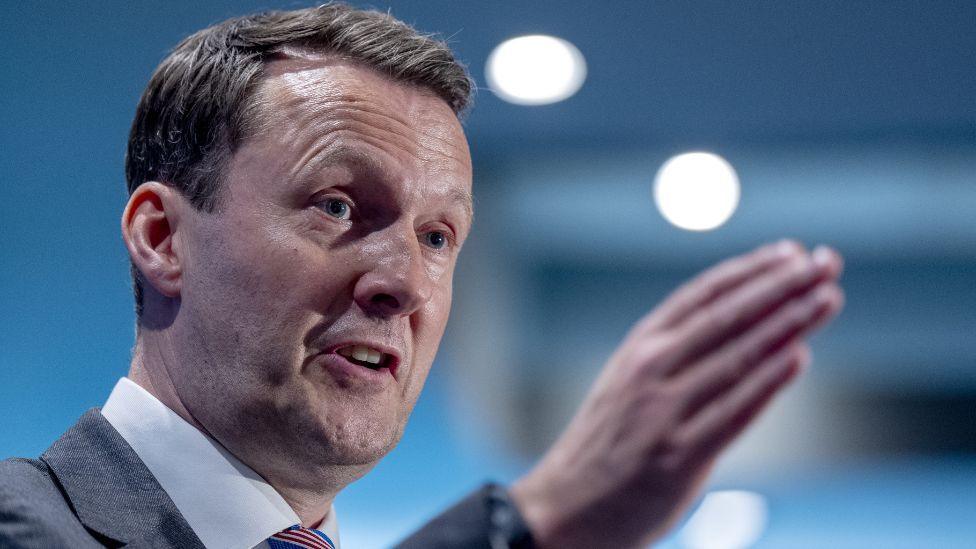Backlash over plans to house 300 asylum seekers at Inverness barracks
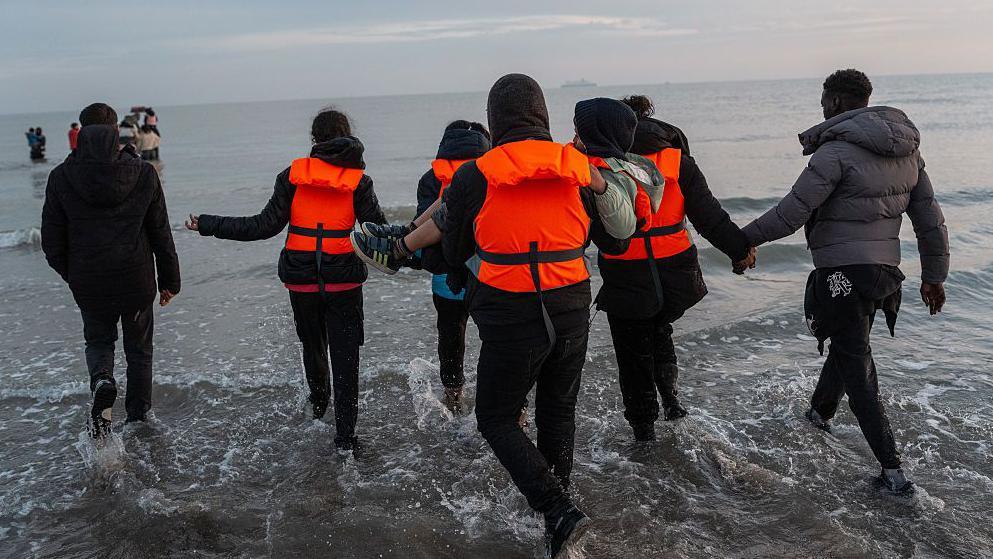
About 300 asylum seekers are expected to be housed at Cameron Barracks in phases
- Published
Concerns have been raised about "community cohesion" after it emerged that a military base in Inverness has been earmarked to temporarily house about 300 asylum seekers.
BBC News understands that Cameron Barracks and an East Sussex army training camp will be used to house a total of about 900 men by the end of the year.
Both the Scottish government and three senior Highland councillors have highlighted concerns about the plans to the Home Office.
In a joint statement, the councillors said: "Our main concern is the impact this proposal will have on community cohesion given the scale of the proposals as they currently stand."
"Inverness is a relatively small community but the potential impact locally and across the wider Highlands appears not to have been taken into consideration by the UK government," they added.
Scotland's Social Justice Secretary Shirley-Anne Somerville said the Scottish government had urged the Home Office to work closely with Highland Council.
A UK government minister said the move would allow them to close asylum hotels at a faster rate.
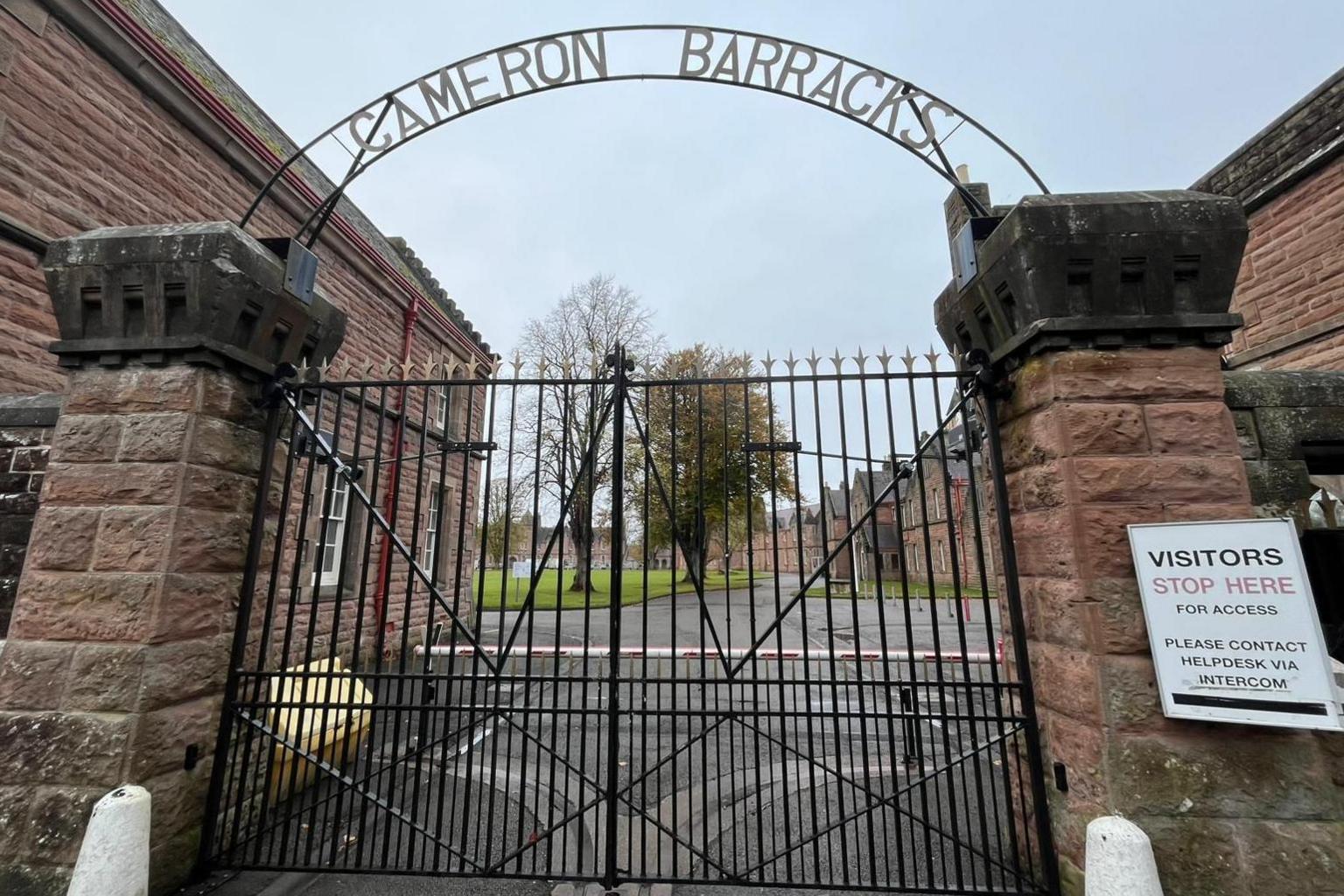
Cameron Barracks is a 140-year-old military base near Inverness city centre
Highland Council said it understood the property would be used in phases as transitional accommodation from early December for up to 12 months.
It said it had requested additional information from the Home Office about the plans for the city. The Inverness area has a population of about 83,000.
The council's Independent convenor Bill Lobban, leader and SNP councillor Raymond Bremner and opposition leader and Lib Dem Alasdair Christie, said they only received written confirmation of the UK government's plans on Monday.
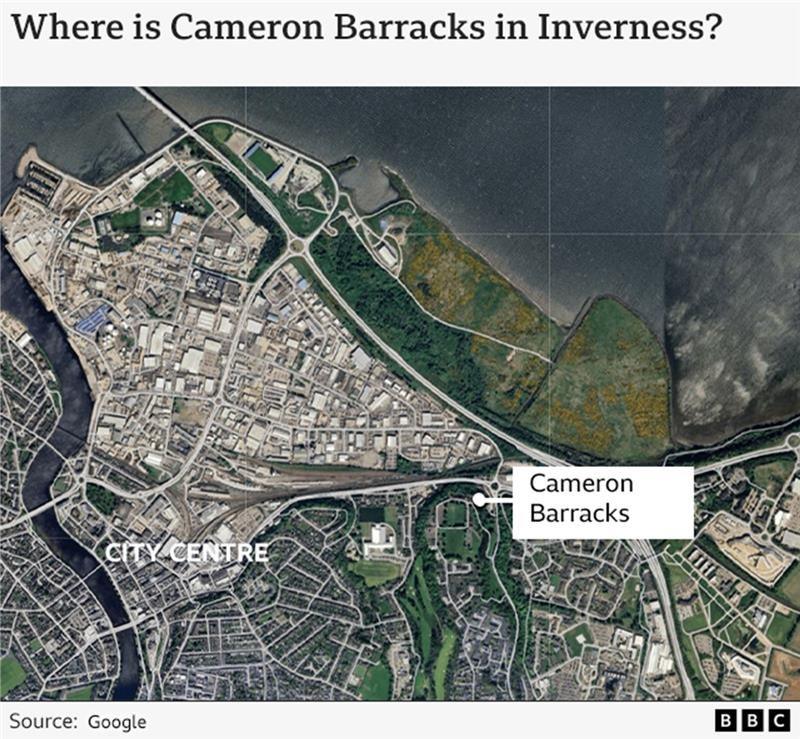
In their statement, the senior councillors said: "We await more details on how Inverness was selected over other available locations and how community cohesion will be maintained given the large number of asylum seekers planned relative to the local population.
"The UK government have informed us that their accommodation will be self-contained, with all necessary services provided on site.
"The asylum seekers are 'non-detained', meaning they will be free to leave their site should they wish."
Cameron Barracks sits on a hilltop near Inverness city centre, close to Raigmore Hospital, supermarkets and fast food takeaways.
Highland Council will hold a special meeting on the plans next Thursday.
What are the government's options on asylum seeker accommodation?
- Published28 October
'Very mixed feelings' - How locals view a nearby asylum seeker hotel
- Published11 September
Social Justice Secretary Shirley-Anne Somerville said: "The Home Office is responsible for the provision of all asylum accommodation and we are aware that they are considering accommodating people seeking asylum in Cameron Barracks.
"We have raised our concerns about the suitability of the site with them and have urged them to engage closely with Highland Council and other service providers."
The moves comes just months after the Ministry of Defence (MoD) said it was phasing out use of the 140-year-old barracks as a site for housing people from Afghanistan who had risked their lives helping the UK armed forces.
The MoD said at the time that the barracks would be returned to use as a military base.
Refugee charity Care4Calais said placing asylum seekers in military sites would be a "complete failure" of UK government policy.
Chief executive Steve Smith said: "Opening more camps will only serve to retraumatise more people who have already survived horrors such as war and torture."
'Not luxury accommodation'
A Home Office spokesperson said: "We are furious at the level of illegal migrants and asylum hotels.
"This government will close every asylum hotel. Work is well under way, with more suitable sites being brought forward to ease pressure on communities.
"We are working closely with local authorities, property partners and across government so that we can accelerate delivery."
The UK government has pledged to end the use of asylum hotels, which have cost billions of pounds and become a focal point for anti-migrant protests, by the next election.
Prime Minister Sir Keir Starmer told the BBC he had told Home Office and Ministry of Defence officials to "go faster, go further" to locate appropriate military sites.
Speaking to BBC North West Tonight, Starmer said he was "really pleased" that more asylum seekers would be housed on military bases "by the end of this year".
Later, Downing Street refused to be drawn on whether moving asylum seekers out of hotels into former military barracks would save money.
The PM's spokesman said cost of using barracks would "vary from site to site".
Earlier Defence Minister Luke Pollard told BBC Breakfast that the military sites were not "luxury accommodation by any means," but "adequate for what is required".
"That will enable us to take the pressure off the asylum hotel estate and enable those to be closed at a faster rate," he said.
Lack of consultation
Liberal Democrat MP for Inverness, Skye and West Ross-shire, Angus MacDonald, said he supported the use of military sites to house asylum seekers, but that the chosen base seemed "a bit odd" given it is in the city centre.
"It's effectively the same," he told BBC Radio 4's Today programme, adding that to his knowledge it was an open barracks without security.
"I very much thought the idea of putting them in army camps was to have them out of town, and make them less of an issue for the local population."
Fergus Ewing, Independent MSP for Inverness and Nairn, said residents had contacted him concerned about how "secure and suitable" the barracks are.
He said: "In the few hours since the news broke, I have already received numerous messages from constituents expressing deep concern, distress and anger.
"The people of Inverness are compassionate and welcoming but this decision has been made without any local dialogue, planning or reassurance about safety, security and support arrangements."
Scottish Conservative MSP for Highlands and Island Edward Mountain also criticised the lack of consultations, and described the barracks plan as a "back-of-a-fag-packet idea".
Ariane Burgess, Scottish Green MSP for the Highlands and Islands, said the move would be "deeply disrespectful to both asylum seekers and Highland communities".
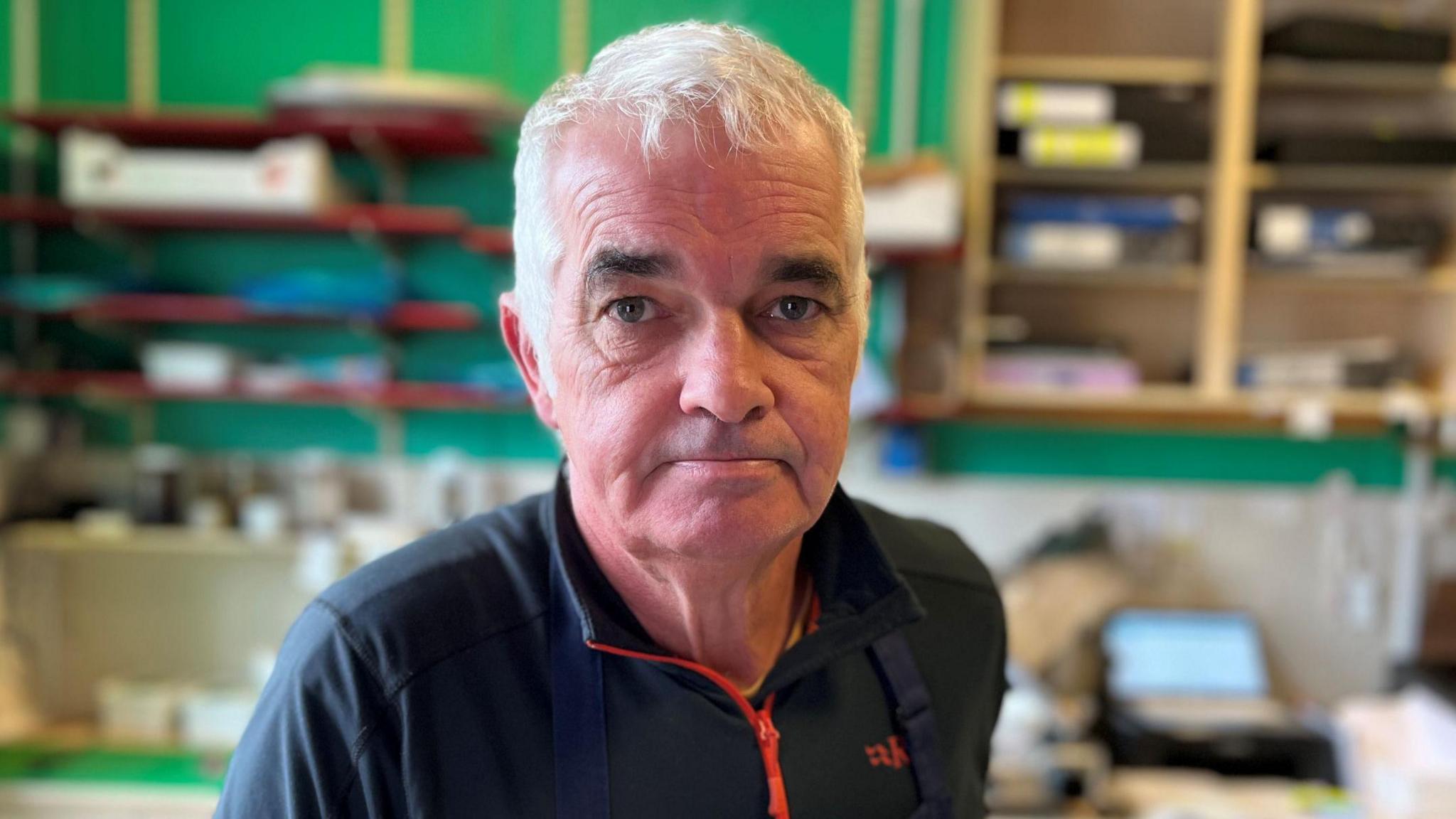
Roddy Morrison said the barracks could be used for housing asylum seekers if the site was empty
The news has come as a surprise to residents of Inverness.
Roddy Morrison, who runs a shop in the Crown area in Inverness city centre, said: "If the barracks are empty and these people need somewhere to live I don't see why not use the barracks rather than putting them in hotels."
But Inverness Conservative councillor Isabelle MacKenzie said there had been a lack of detail on the proposals.
She told BBC Scotland News: "I am deeply shocked and concerned that we as local councillors in the city area were not informed.
"That is totally unprofessional and it will cause huge alarm and concern in the community."
What is an asylum seeker?
An asylum seeker is someone asking for sanctuary due to dangers in their home country
In the UK, all applications for asylum are processed by the Home Office.
Asylum seekers do not have the same rights as a refugee or a British citizen while they wait for a decision. For example, asylum seekers are not allowed to work.
Successful applicants are given refugee status, but the applicant usually has to leave the country if their claim is rejected and any appeal is unsuccessful.
How many asylum seekers are there in the Highlands?
Since January 2022, Highland Council has supported asylum seeking children through the Home Office's National Transfer scheme, external.
The local authority, working with charities and other organisations, set up the Comraich service in December 2022 to lease accommodation for 56 young people aged 16 and over.
Latest Home Office data from June shows that the Highland local authority area, with a population 236,330, also had 143 people living there under the Afghan resettlement programme.
A further 438 Ukrainians have moved to the area under a resettlement scheme launched after the Russian invasion of Ukraine.
The first scheme to be supported by Highland Council was the Vulnerable Persons Resettlement Scheme in 2016.
It enabled families from Syria to be resettled into properties provided by the local authority.
Across Scotland, there are a total of 6,107 asylum seekers, a figure that has been steadily rising in recent years in line with the record numbers of applications across the UK, but it still only accounts for 0.11% of Scotland's total population.
The vast majority of asylum seekers in Scotland - 4,152 - are living in Glasgow.

The prime minister is under huge pressure to reduce the flow of migrants arriving in the UK and to speed up the asylum process.
The UK government has an obligation to accommodate asylum seekers who are waiting for their cases to be judged.
Using hotels for this purpose has become highly controversial with protests at sites across Scotland and the wider UK this summer.
Making use of military facilities is an attempt to ease pressure on hotels with a view to ending their use over time.
Choosing Cameron Barracks is proving unpopular with local politicians concerned about the impact on public services and community cohesion.
The Scottish government is not against the use of military sites in principle but argues that prior consultation was required to find the right solution.
It is ultimately a decision for the UK Home Office but it is not clear whether or not planning permission from Highland Council may be required to change the use of the Inverness barracks.
Councils in England are already wrangling with the UK government in the courts over asylum accommodation.
Planning rules are different in Scotland but it is possible the law in this area could be tested at some point.
Related topics
- Published10 September
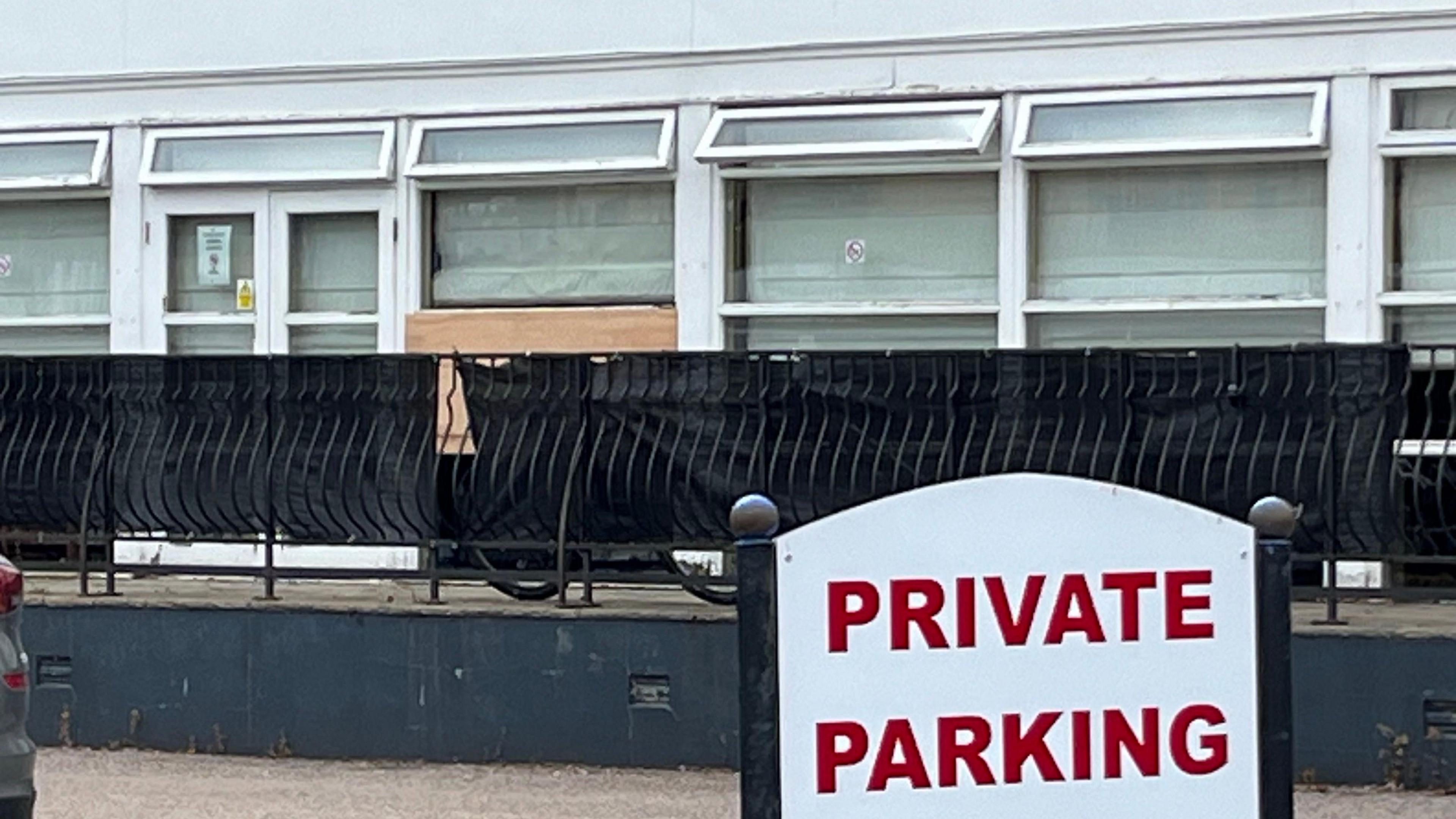
- Published25 August
